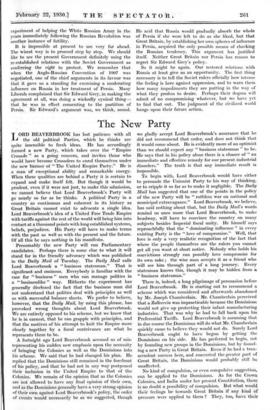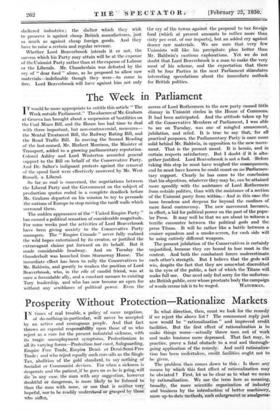The New Party
T.ORD BEAVERBROOK has lost patience with all the old political Parties, which he thinks are quite insensible to fresh ideas. He has accordingly formed re . a new Party, which takes over the " Empire Crusade " as a going concern, and invites those who would have beeome Crusaders to enrol themselves under the new banner of " The United Empire Party." He is a man of exceptional ability and retharkable energy. When these qualities are behind a Party it is certain to expand and make itself felt. But though it would be pindent, even if it were riot just, to make 'this admission, we cannot believe that Lord Beaverbrook's Party will go nearly so far as he' thinks: A political Party in a country 'so continuous and coherent in its history as Great Britain 'cannot exist to advocate a single idea. Lord Beaverbrook's idea Of a United Free Trade Empire With tariffs against the rest of the world will bring him into contact at a thousand points with long established systems, beliefs, prejudices. His Party will have to make terms with the past as well as with the present and the future. Of all this he says nothing in his manifesto; Presumably the new Party will run Parliamentary candidates. Perhaps there is some clue to what it will stand for in the friendly advocacy which was published in the Daily Mail Of Tuesday. The Daily Mail calls Lord Beaverbrook a " business statesman." That is significant and ominous. Everybody is familiar with the case for "business " men who can manage politics in a "businesslike " way. Hitherto the experiment has generally disclosed the fact that the business man did not understand that politics deal with principles as well as with successful' balance sheets. We prefer to believe, however, that the Daily Mail, by using this phrase, has provoked wrong thoughts about Lord Beaverbrook. We are entirely opposed to his scheme, but we know that he is in earnest, that he can grapple with principles, and that the motives of his attempt to knit the Empire more closely together by a fiscal contrivance are what he represents 'them to be.
A fortnight ago Lord Beaverbrook accused us of mis- representing his sudden new emphasis upon the necessity of bringing- the Colonies as well as the Dominions into his scheme. We said that he had changed his plan. He replied that the Dominions still remained in the forefront of his policy, and that he had not in any way postponed their inclusion in the United Empire to that of the Colonies'. We remain of the opinion that as the Colonies are not allowed to have any final opinion of their own, and as the Dominions generally have a very strong opinion of their own against Lord Beaverbrook's policy, the order of events would necessarily be as we suggested, though we gladly accept Lord Beaverbrook's assurance that he did not recommend that order, and does not think that it would come about. He is evidently more of an optimist than we should expect any " business statesman " to be. He says that in his policy alone there is a chance of " an immediate and effective remedy for our present industrial disorders." The truth is that any immediate result is impossible.
To begin with, Lord Beaverbrook would have either to persuade the Unionist Party to •his way of thinking, or to cripple it so far as to make it negligible. The Daily Mail has suggested that one of the points in the policy of the new Party will be " ruthless war on national and municipal extravagance." 'Lord Beaverbrook, we believe, has said nothing about that, but the Daily Mail's words remind us once more that Lord Beaverbrook, to make headway, will have to convince the country on many subjects besides Imperial fiscal unity. He himself says reproachfully that the " dominating influence " in every existing Party is the " love of compromise."- Well, that love is only a very realistic recognition of the fact that where the people themselves are the rulers you cannot get all you want at short notice. Nobody who holds his convictions strongly can possibly love compromise for its own sake ; the wise man accepts it as a friend who will see him through part of a long journey. Every statesman knows this, though it may be hidden from a " business statesman."
There is, indeed, a long pilgrimage of persuasion before Lord Beaverbrook. He is starting out to recommend a scheme which was considered and afterwards abandoned by Mr. Joseph Chamberlain. Mr. Chamberlain perceived that a Zollverein was impracticable because the Dominions would not give up protecting their infant manufacturing industries. That was why he had to fall back upon his Preferential Tariffs. Lord Beaverbrook is assuming that in due course the Dominions will do what Mr. Chamberlain quickly came to believe they would not do. Surely Lord Beaverbrook ought to have begun by getting the Dominions on his side. He has preferred to begin, not by founding new groups in the Dominions, but by found- ing a new Party in Great Britain. Even if he had a tran- scende.nt success here, and converted the greater part of Great Britain, the Dominions would probably still be unaffected.
No kind of compulsion, or even compulsive suggestion, can be applied to the Dominions. As for the Crown Colonies, and India under her present Constitution, there is no doubt a possibility of compulsion. But what would their feelings be towards Great Britain if any kind of pressure were applied to them ? They, too, have their sheltered industries ; the shelter which they wish to preserve is against cheap .British, manufactures, just as. much as against cheap foreign. goods. And they have to raise a certain and regular revenue.
Whether Lord Beaverbrook intends it or not, the success which his Party may attain will be at the expense of the Unionist Party rather than at the expense of Labour_ or the Liberals. Mr. Chamberlain was defeated by the cry of " dear food " alone, as he proposed to allow raw materials—indefinable though they were7-to come in free. Lord Beaverbrook will have against him not only the cry of the towns against the proposal to tax foieign food (which at present amounts to rather more than. sixty per cent. of our imports), but an added cry against dearer raw materials. We are sure that very few Unionists will like his precipitate plan better, than Mr. Baldwin's cautious explorations. Yet we do not doubt that Lord Beaverbrook is a man to make the very most of his scheme, and the expectation that there will be four Parties in the next Parliament stimulates interesting speculations about the immediate outlook for British politics.











































 Previous page
Previous page